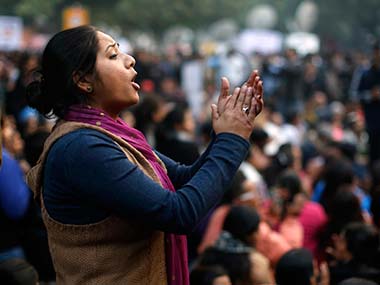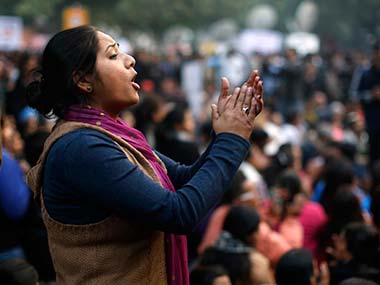On Friday evening, inter spliced with looped footage of Tarun Tejpal on an airline making his ignominious way to Goa, a major news network hosted a panel of apoplectic guests voicing their indignation at his many sins. Among them was a high-profile male columnist – a longtime regular on the TV circuit – who waxed eloquent against Tejpal’s outrageous and immoral behaviour. [caption id=“attachment_1262025” align=“alignleft” width=“380”]  Reuters[/caption] Such show of support would have been hugely heartening for women in the audience except for this man’s well-established reputation in Delhi social circles for propositioning and often physically groping every pretty woman who crosses his path. It is unlikely that the anchor who invited him on the show was unaware of his infamy. And yet there he was: enjoying an undeserved platform to grandstand against sexual harassment. Scandals often bring out the worst in us: our schadenfreude, appetite for prurient detail, and of course, moral hypocrisy. It is always easier to cast stones at another – more so, when it allows us to disguise our own shortcomings. Nowhere is this more apparent than in the media which excels in the business of finger-pointing. Tejpal’s fall from grace ought to have been a warning nudge toward self-reflection – or at the minimum, a reminder of the fragility of glass houses. And yet here was this columnist, blissfully ranting at length on television, unfettered by the fear of exposure. No one called him out, but author Jerry Pinto wasn’t quite as lucky. Pinto ran into trouble when he posted a number of updates in support of the alleged Tehelka victim on Facebook. At least 3 women writers – Margaret Mascarenhas, Venita Coelho, Rosalyn D’mello – then reminded Pinto of his own actions when he protected a Goan friend accused of sexual harassment. Apart from stalking the alleged victims, reports Mumbai Mirror, “In one instance, the aggressor had stalked the woman, flooded her inbox with porn, arrived at her house unannounced and flashed himself. Seems that is his modus operandi.” When the women complained about this writer’s behaviour to members of the Goa Writers Group, including Pinto, the response was less than heartening. Each of the complainants had exchanged string of emails with Pinto… reporting the incident, most of which could be produced as digital evidence if they choose to escalate the matter. But Pinto dismissed their dissent, saying: “Strong women don’t get molested.” The aggressor continues to find favour with the festival directors, much to the disappointment of the complainants… The complainants were disappointed when the infamous boy’s club stonewalled their demands for a stronger punitive action against the culprit. Pinto’s response to being called out on Facebook was swift: “[He] reacted to the emotional outburst of the complainants by deleting their comments and unfriending them.” When Firstpost reached out to Jerry Pinto, he pointed us to his clarification to Mid-day, where he says [You can read it in its entirety here]: When one of the members of the Goa Writers Group was accused of sexual harassment, I pointed out that he had probably been guilty of sexual misconduct and that the term sexual harassment was probably inaccurate since there was no fiduciary connection and no power equation between him and his alleged victims. I defended my friend but I also suggested to him that he apologise if he had been at fault and that he withdraw from his position as moderator. I expressed my opinion in a closed group, a writers’ group, where I thought language would be used accurately and where in my opinion it had not. My friend withdrew and I did so too. The matter I thought had ended there. If there was any more speaking out to do, it was surely the prerogative and the right of the women who had felt victimised. I do not see what else I could do. Whatever the veracity of these allegations, Pinto’s notion of “closed group” points to a certain cluelessness among writers and journalists who continue to rely on a discretion in media/literary circles that no longer exists. There is nowhere to hide when everything is but a FB update or tweet away from public exposure. Shoma Chaudhury clearly didn’t comprehend this new reality. Neither, it seems, do some of the very same peers who rush to condemn her. There is also a sense – perhaps shared by the anchor who invited that columnist on as a guest – that sexual ‘misconduct’ in social circles is not as serious as when it happens in the workplace. An assessment evidently not shared by women in those same circles, and hence the pushback. Bottomline is that we are now accountable for our actions, even if we see it, as Pinto does, as “stand[ing] up for friends” All that lofty grandstanding sets a high standard by which one must be prepared to be judged – and almost inevitably found wanting.
All that lofty grandstanding sets a high standard by which one must be prepared to be judged – and almost inevitably found wanting. As author Jerry Pinto recently found out.
Advertisement
End of Article


)
)
)
)
)
)
)
)
)



